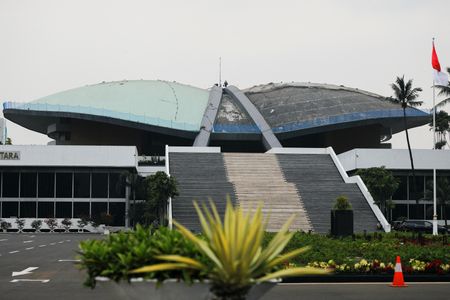By Stefanno Sulaiman
JAKARTA (Reuters) – Indonesia’s parliament moved a step closer on Thursday to approving an even bigger spending allocation and a wider fiscal deficit forecast for President Prabowo Subianto than he had sought for the 2026 budget.
Anti-government protests that began in August have unsettled financial markets, leaving investors watching Indonesia’s fiscal plans for signs of weakening discipline after respected finance minister Sri Mulyani Indrawati was sacked last week.
A parliamentary fiscal oversight panel approved a total spending plan of 3,842.7 trillion rupiah ($233 billion) in the 2026 budget, with the fiscal deficit forecast at 2.68%, Said Abdullah, its chair, said.
That figure is 56.2 trillion rupiah higher than Prabowo’s August proposal to parliament, and about 9% higher than estimated total spending for 2025.
The budget deficit in Southeast Asia’s largest economy is forecast at 2.78% of GDP this year, below a threshold of 3% set by law.
The panel’s revenue target of 3,153.6 trillion rupiah is up 5.9 trillion over the original proposal and about 10% bigger than estimated revenues in 2025.
A wider parliamentary vote is expected on Sept. 23. Parliament, overwhelmingly controlled by Prabowo’s coalition, usually passes the panel’s endorsement.
Sri Mulyani had prepared Prabowo’s original budget proposal.
The wider deficit plan was fine, said new finance minister Purbaya Yudhi Sadewa, adding, “It’s still below 3% (of GDP) and is needed to create higher economic growth. Don’t worry, we will be prudent.”
Prabowo has set a GDP growth target of 5.4% for 2026, aiming for a rate of 8% within his five-year term, which runs until 2029.
The government is seizing the chance to pursue policies that drive growth with the wider fiscal gap as the U.S. Federal Reserve looks likely to maintain an accommodative stance until the first half of 2026, said Victor Matindas, an economist with one of Indonesia’s biggest banks, BCA.
Indonesia must find ways to increase revenues from non-tax sources, rather than relying on bonds issuance to plug the widening budget gap, said Telisa Falianty, an economist with the University of Indonesia.
REGIONAL TRANSFERS INCREASED
Although the budget allocation for regional governments has been increased to 693 trillion rupiah from the original 650 trillion, it is still about a fifth less than regional transfers in 2025.
Regional leaders had complained that Prabowo’s original proposal would lead to increases in land and building taxes to cover the shortfall.
The concession was meant to maintain social and political stability at local levels, Purbaya said, promising spending by Jakarta on development programmes nationwide to make up for the smaller transfers.
There was no immediate breakdown of the changes, but senior finance ministry official Febrio Kacaribu said the budget for Prabowo’s priority spending was unchanged.
The allocation for a flagship programme of free meals for students and pregnant women is 335 trillion rupiah, while defence spending is 335.3 trillion in the original proposal.
($1=16,505 rupiah)
(Writing by Gayatri Suroyo; Editing by David Stanway and Clarence Fernandez)










